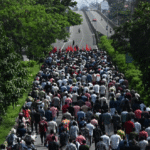Introduction
Fall of Damascus recent fall of Damascus, signaling the collapse of Syrian President Bashar al-Assad’s government, marks a pivotal moment in the tumultuous history of the Syrian Civil War. For neighboring Turkiye, which has supported opposition factions since the conflict’s inception in 2011, this development aligns with its long-standing objective of removing Assad. However, it also brings a complex mix of opportunities and challenges, particularly concerning refugee management, regional security, and its influence in the fractured Syrian state.
This article explores the implications of Assad’s fall for Turkiye, delving into its strategic goals, the risks of territorial disintegration in Syria, and the broader geopolitical consequences of this monumental event.  For the more information click on this link
For the more information click on this link
Turkiye’s Role in the Syrian Civil War
Strategic Goals in Syria
Since the onset of the Syrian Civil War, Turkiye has been one of the most active regional players, pursuing a multifaceted strategy:
- Support for Opposition Forces:
- Turkiye has provided extensive military, financial, and logistical support to anti-Assad factions, including the Free Syrian Army (FSA).
- This support aimed to establish a friendly government in Damascus, aligned with Turkiye’s regional interests.
- Border Security:
- The 911-kilometer-long frontier with Syria makes border stability a paramount concern.
- Turkiye has worked to neutralize threats from extremist groups and Kurdish militias operating near its border.
- Humanitarian Leadership:
- Turkiye currently hosts over 3.6 million Syrian refugees, making it the largest host nation for displaced Syrians.
- Its involvement in Syria also reflects an effort to manage and mitigate refugee flows.
- Countering Kurdish Aspirations:
- Preventing the establishment of an autonomous Kurdish region in northern Syria remains a cornerstone of Turkiye’s policy, as it fears the spillover effect on its own Kurdish population.
The Fall of Damascus: Strategic Gains for Turkiye
Elimination of Assad’s Regime
For Turkiye, Assad’s removal represents the culmination of a long-sought objective.
- Political Victory: The fall of Damascus vindicates Turkiye’s years of opposition to Assad, positioning Ankara as a key player in post-conflict Syria.
- Influence in Reconstruction: Turkiye is likely to leverage its role in supporting opposition groups to secure a dominant position in shaping Syria’s future political landscape.
Enhanced Regional Influence
The power vacuum left by Assad’s fall provides an opportunity for Turkiye to expand its influence in the region.
- Alliances with Syrian Opposition: Turkiye’s close ties with opposition factions enable it to play a central role in transitional governance.
- Geopolitical Leverage: By asserting control over key territories in northern Syria, Fall of Damascus can strengthen its bargaining position with other global powers.
Potential Economic Benefits
- Reconstruction Opportunities: Turkiye’s construction and infrastructure firms could benefit from lucrative contracts in rebuilding war-torn Syria.
- Trade Revival: Stability in Syria could lead to the revival of cross-border trade, Fall of Damascus boosting economic ties between the two nations.
Challenges and Risks for Turkiye
Territorial Disintegration and Refugee Influx
The fall of Damascus may exacerbate the territorial fragmentation of Syria, posing several risks for Turkiye:
- New Wave of Refugees:
- The power vacuum could lead to intensified fighting among rival factions, displacing millions more.
- Turkiye, already strained by hosting millions of refugees, Fall of Damascus may face an unsustainable burden.
- Fragmentation of Authority:
- The absence of a central government increases the likelihood of Syria splintering into zones controlled by various militias and ethnic groups.
- Such fragmentation could destabilize Turkiye’s border regions.
Kurdish Aspirations for Autonomy
The weakening of central authority in Syria could embolden Kurdish groups, Fall of Damascus such as the Syrian Democratic Forces (SDF), to push for greater autonomy.
- Turkiye’s Security Concerns:
- Ankara views Kurdish autonomy as a direct threat to its territorial integrity, fearing it could inspire separatist movements among its own Kurdish population.
- Turkiye may escalate military operations in northern Syria to prevent such developments.
Geopolitical Complexities
- Competition with Global Powers:
- Russia and Iran, long-time backers of Assad, may seek to protect their interests in Syria even after his fall.
- The US may also play a significant role in shaping post-Assad Syria, potentially clashing with Turkiye’s objectives.
- Managing Relations with Arab States:
- While some Arab nations may welcome Assad’s fall, Fall of Damascus others might view Turkiye’s growing influence with suspicion.
- Turkiye will need to navigate these dynamics carefully to avoid alienating regional allies.
Regional and International Reactions
Syrian Opposition
- Celebration of Victory: Syrian opposition groups, many of which operate with Turkiye’s support, have welcomed Assad’s fall as a step toward democracy and stability.
- Challenges in Governance: The opposition now faces the daunting task of unifying disparate factions to establish a cohesive administration.
Russia and Iran
- Strategic Setback: Assad’s fall represents a significant loss for Moscow and Tehran, Fall of Damascus which invested heavily in propping up his regime.
- Likely Retaliation: Both nations may continue to back loyalist factions or proxy forces to maintain their influence in Syria.
The United States and NATO
- Support for Stability: Washington is likely to endorse efforts to stabilize Syria and counter extremist groups.
- Coordination with Turkiye: As a NATO ally, Turkiye’s role in Syria aligns with broader Western interests, though differences over Kurdish groups may persist.
Humanitarian Impact
Displacement Crisis
The fall of Damascus has triggered a fresh wave of displacement as civilians flee the chaos.
- Turkiye’s Role: As the primary host nation for Syrian refugees, Fall of Damascus will face increased pressure to provide shelter and services.
- International Aid: The global community must step up support to prevent a humanitarian catastrophe.
Post-War Reconstruction
Rebuilding Syria will require massive investments and international cooperation.
- Turkiye’s Contribution: Given its proximity and resources, Turkiye is well-positioned to lead reconstruction efforts.
- Collaboration with Global Partners: Success will depend on coordinated efforts involving regional and global stakeholders.
The Path Forward for Turkiye and Syria
Diplomatic Engagement
Turkiye must engage in proactive diplomacy to shape Syria’s future while addressing regional concerns.
- Mediation Role: As a key player, Turkiye can facilitate negotiations among rival factions.
- Building Alliances: Strengthening ties with Arab states and Western allies will enhance Turkiye’s influence.
Managing Kurdish Relations
Balancing security concerns with the rights of Kurdish groups will be critical.
- Negotiation Over Confrontation: Dialogue with moderate Kurdish leaders could reduce tensions and foster stability.
- Economic Integration: Investing in development projects in Kurdish-majority areas may help address grievances.
 For the more information click on this link
For the more information click on this link
Focus on Refugees
Turkiye must adopt comprehensive policies to manage the refugee crisis effectively.
- Resettlement Initiatives: Encouraging the voluntary return of refugees to safe areas in Syria.
- International Support: Securing additional aid from global partners to share the burden.
Conclusion
The fall of Damascus marks a historic turning point in the Syrian Civil War, Fall of Damascus aligning with Turkiye’s long-standing goal of removing Assad. However, it also presents a complex web of challenges, from managing refugee flows to navigating geopolitical rivalries and addressing security concerns.
As Turkiye steps into a leadership role in shaping post-Assad Syria, Fall of Damascus its ability to balance ambition with pragmatism will determine its success. The coming months will be critical in defining not just the future of Syria, but also Turkiye’s position in the regional and global order. ALSO READ:- Tragedy in Khartoum: Sudan Shelling Claims 28 Lives at Fuel Station 2024





